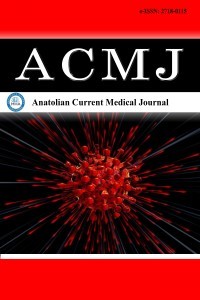1.
Jacques F, Isabelle S, Rajesh D, et al. Cancer incidence andmortality worldwide: sources, methods and major patterns inGLOBOCAN 2012. Int J Cancer. 2015;136(5):E359-E386.
2.
Wani B, Aziz SA, Ganaie MA, Mir MH. Metabolic syndrome andbreast cancer risk. Indian J Med Paediatr Oncol. 2017;38(04):434-439.
3.
Balkau B, Valensi P, Eschwege E, Slama G. A review of themetabolic syndrome. Diabetes Metabolism. 2007;33(6):405-413.
4.
Ray A, Fıcek M. Immunomodulatory effects of antiestrogenicdrugs. Acta Pharm. 2012;62(2):141-155.
5.
Kang C, LeRoith D, Gallagher EJ. Diabetes, obesity, and breastcancer. Endocrinol. 2018;159(11):3801-3812. doi: 10.1210/en.2018-00574
6.
Wright N, Akinyemiju T, Subhedar P, Rida P, Aneja R. Targetingrisk factors for reducing the racially disparate burden in breastcancer. Front Biosci. 2019;11(1):136-160. doi: 10.2741/s531
7.
Ming Xie, Yan Zhong, Yide Yang, Fang Shen, Yue Nie. Extendedadjuvant endocrine therapy for women with hormonereceptor-positive early breast cancer: a meta-analysis with trialsequential analysis of randomized controlled trials. Front Oncol.2022;12:1039320. doi:10.3389/fonc.2022.1039320
8.
Battisti NML, Smith IE. Preventing late recurrence in hormonereceptor-positive early breast cancer: a review. Eur J Cancer.2022;172:53-64. doi: 10.1016/j.ejca.2022.05.028
9.
Zackariah C, James K, Janne B, Robert W, Melissa B. Extendedduration of adjuvant aromatase inhibitor in breast cancer: ameta-analysis of randomized controlled trials. Gland Surg.2018;7(5):449-457. doi: 10.21037/gs.2018.08.03
10.
Pasanisi P, Berrino F, De Petris M, Elisabetta V, Antonio M,Salvatore P. Metabolic syndrome as a prognostic factor for breastcancer recurrences. Int J Cancer. 2006;119(1):236-238.
11.
Vona DL, Howard MM, Rose DP. Adiposity, type 2 diabetesand the metabolic syndrome in breast cancer. Obes Rev.2007;8(5):395-408.
12.
Agnoli C, Berrino F, Abagnato CA, et al. Metabolic syndrome andpostmenopausal breast cancer in the ORDET cohort: a nestedcase-conrtol study. Nutr Metab Cardiovasc Dis. 2010;20(1):41-47.
13.
Kuhl H. Breast cancer risk in the WHI study: the problem ofobesity. Maturitas. 2005;51(1):83-97.
14.
Esposito K, Chiodini P, Colao A, Lenzi A, Giugliano D. Metabolicsyndrome and risk of cancer: a systematic review and meta-analysis. Diabetes Care. 2012;35(11):2402-2411.
15.
Mendonca FM, de Sousa FR, Barbosa AL, et al. Metabolicsyndrome and risk of cancer: which link? Metabolism.2015;64(2):182-189. doi:10.1016/j.metabol.2014.10.008
16.
Metabolik Sendrom Araştırma Grubu. METSAR sonuçları.XX.Ulusal Kardiyoloji Kongresi. Antalya, 2004.
17.
Grundy SM, Cleeman JI, Daniels SR, et al. Diagnosis andmanagement of the metabolic syndrome: an American HeartAssociation/National Heart, Lung, and Blood Institute ScientificStatement. Circulation. 2005;112(17):2735-2752.
18.
Sinagra D, Amato C, Scarpilta AM, et al. Metabolic syndromeand breast cancer risk. Natl Cancer Inst. 2004;96:1152-1160.
19.
Johansson H, Gandini S, Guerrieri GA, et al. Effect of fenretinideand low dose tamoxifen on insulin sensitivity in premenopausalwomen at high ris for breast cancer. Cancer Res. 2008;68(22):9512-9518.
20.
Bordeleau L, Lipscombe L, Lubinski J, et al. Diabetes and breastcancer among women with BRCA1 and BRCA2 mutations.Cancer. 2011;17:1812-1818.
21.
Yazıcı G, Sayın M. Role of aromatase inhibitors in glucoseintolerance of obese men. Med Hypotheses. 2008;71(4):612-613.doi:10.1016/j.mehy.2008.05.012
22.
La Merrill M, Baston DS, Denison MS. Mouse breast cancermodel-dependent changes in metabolic syndrome-associatedphenotypes caused by maternal dioxin exposure and dietary fat.Am J Physiol Endocrinol Metab. 2009;296(1):203-210.
23.
Furberg AS, Veierod MB, Wilsgaard T, et al. Serum highdensitylipoprotein, cholesterol, metabolic profile, and breast cancer risk.Natl Cancer Inst. 2004;96(15):1152-1160.
24.
Sarıcı F, Sunar V, Aksoy S. The frequency and determinants ofmetabolic syndrome in operated patients with stage I-III breastcancer. Int J Hematol Oncol. 2022;33(3):001-010.
25.
Maiti B, Kundranda MN, Spiro TP, Daw HA. The association ofmetabolic syndrome with triple-negative breast cancer. BreastCancer Res Treat. 2010;121(2):479-483.
26.
Kozan Ö, Oguz A, Abaci A, et al. Prevalence of the metabolicsyndrome among Turkish adults. Eur J Clin Nutr. 2007;61(4):548-553.
27.
Lippman SM, Hong WK. Cancer Prevention, Cecil MedicineInternational Edition. Ed. Goldman L, Ausiello D. Philadelphia,Saunders Elsevier. 2008;1367-1370.
28.
Capasso I, Esposito E, Pentimalli F, Anna C, Maurizio M, Maria G.Metabolic syndrome affects breast cancer risk in postmenopausalwomen. National Cancer Institude of Naples experience. CancerBiol Ther. 2010;10(12):1240-1243.
29.
Liu LN, Miaskowski C, Wang JS, Shin-Cheh C, Mei-Ling C.Accuracy of body mass index to determine obesity in womenwith breast cancer: an observational study of TaiWanese sample.Int J Nurs Stud. 2010;47(8):994-1000.

